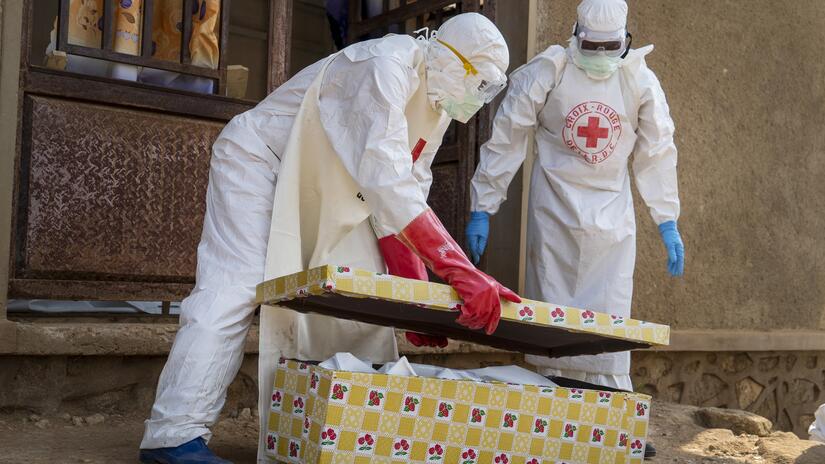Beni/Kinshasa/Nairobi/Geneva, 16 December 2021—The Red Cross of the Democratic Republic of Congo (DRC) joins the International Federation of Red Cross and Red Crescent Societies (IFRC) in celebrating the end of the 13th Ebola outbreak in the country.
The Minister of Public Health, Hygiene and Prevention of the DRC, officially declared, this 16 December 2021, the end of the 13th outbreak of Ebola Virus Disease which resurfaced on 8 October 2021, in the health zone of Beni in the province of North Kivu.
This declaration comes 42 days after the last patient tested negative.
A cumulative 11 cases were recorded during this 13th outbreak, including 8 deaths and 2 cured.
David Fisher, Head of the Country Cluster Delegation of the IFRC who is in DRC said:
“We are so happy to arrive at the declaration of the end of the 13th Ebola epidemic today. With support from IFRC, the DRC Red Cross and its local volunteers have been working every day in close coordination with health authorities and other partners to achieve this. And we will not be letting down our guard. Over the next few months of the surveillance period, we are expanding our reach to ensure that no new cases fall through the cracks.”
When the 13th outbreak was declared, the DRC Red Cross mobilized and deployed 215 trained volunteers to help contain the spread of the virus by providing services such as Community Engagement and Accountability (CEA), Prevention and Control of Infections (IPC), as well as Safe and Dignified Burials (SDB), with the support of the IFRC.
Volunteers responded to 429 alerts, provided 116 safe and dignified burials, secured 345 bodies, 28,708 people were reached by Ebola messages and 8,851 community returns were received and analysed.
A focus was also placed on vaccination.
Building on lessons learned and capacities developed in n the follow-up responses to the Ebola outbreaks across the country, volunteers have adapted messages and activities to the context of COVID-19. They shared vital information in public places, on community radio stations, on social media and through messaging apps. Red Cross teams have also set up "rapid response teams" made up of local volunteers who work with local health authorities to transfer positive cases of COVID-19 to safe treatment centres.
Grégoire Mateso, the National President of the DRC Red Cross explains the work carried out by the volunteers in these terms:
“Our volunteers have spared no effort to help those affected in the Beni health zone and we will continue to provide necessary services for the preparation and response to epidemics in the communities in order to preserve the well-being of populations. However, the end of an epidemic is the beginning of this preparation of the community to resist in case another does. Thus, the Red Cross will always be alongside communities in order to provide an adequate response in the event of an epidemic in order to support community resilience through the implementation of a more sustainable community health approach."
Despite the end of this outbreak, it is essential to maintain vigilance and strengthen post-epidemic prevention and surveillance activities in order to avoid the resurgence of the virus.
The epidemic did not spread outside of Beni. In addition to effective care and monitoring mechanisms, the success in the response is justified by a high rate of people already vaccinated against Ebola in the region, especially during the 10th epidemic, the deadliest in history of this disease.
For more information, contact:
Croix-Rouge de la RDC: Kally Maluku, +243 818 966 243, [email protected]
IFRC (DRC): Kelly Kulemfuka Minzas, +243 850 749 025, [email protected]
IFRC (Africa Region): Euloge Ishimwe, +254 735 437 906, [email protected]

